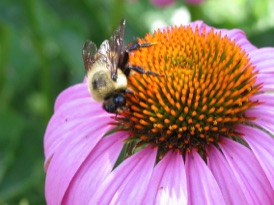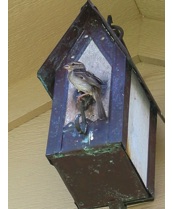In our Wild by Design, Wild Blog, I will explore the life affirming opportunities of “reconciliation ecology” or “Win-Win Ecology” developed by UA Professor Michael L. Rosenzweig and the scientific research of UDel Professor Douglas W. Tallamy, author of Bringing Nature Home. These two researchers are changing the way that gardeners and landscapers all over the world should be creating sustainable landscape design. I hope you’ll join me as I try to unravel this complicated relationship between the natural world and our very human lives within it.

The importance of being Wild...
Who was it that decided that the standard for American yards should be the perfectly manicured green lawn? Well, as it happens, you can blame it on the English aristocracy, rotary push mowers, the USDA, golfers and The American Garden Club. The desire for sweeping lawns of perfectly mowed carpets of blue grass dates to the nobility of 19th Century England that could afford the extensive labor required to scythe the grass on their estates. That image of perfection was to become the desire of the growing middle class of America. More...
A perfect lawn, whose idea was it anyway....
Tuesday, March 1, 2011
Did you ever wonder from whence came the wild garden? Until the mid 19th century gardens and gardening had largely been the provence of kings, queens and the landed gentry, so consequently they were quite rigid in design and presented a very formal atmosphere. Most English and Continental gardens were known for their meticulous displays of newly introduced tropical annuals from South America. Then in 1870, William Robinson in his book, The Wild Garden, condemned this style as “rote and highly wasteful” while expressing his vision... More...
The Wild Garden, where did that even come from...
Wednesday, February 16, 2011
This is a question that has been exhaustively debated by human psychologists for decades, but for birds it’s definitely both nature and nurture. In two studies, scientists asked the question, “Do alien plants harm birds?” In the first study, one habitat was almost entirely native grasses and forbs, whereas the second was dominated by two invasive alien grasses: Lehmann lovegrass (Eragrostis lehmanniana) and buffelgrass (Cenchrus ciliaris). Both of these alien species were introduced in the late 1940s to “restore”... More...
Alien vs native, can it really be that harmful...
Wednesday, February 15, 2011
Did you know that Lepidoptera (moths & butterflies) make up the largest food component of insectivorous birds? In fact, they do. So, here’s a little food for thought. Native plants support 35 times more caterpillar biomass than aliens. And, since bird populations are limited by the amount of food they can find, this means there will be 35 times less food available for birds in habitats that are made up of mostly alien plants. Which in turn means there will be 35 times less bird biomass in those habitats, too. Is it any wonder that our native bird populations are under stress and struggling to survive?
Biomass reality, food for thought...
Wednesday, February 2, 2011
Let’s talk evolution. And, I’m not referring to the age old battle between Darwin and Church. I’m talking about when you import an alien plant from somewhere else on the planet to North America. What happens? Or, in the case of most plants, what’s important is what doesn’t happen. The plant doesn’t support insect life and remains nearly sterile. Why?
The common wisdom amongst gardeners and general studies in Ag education lead one to believe that alien plants will indeed naturalize over time. More...
Native vs naturalized, it's a question of evolution...
Friday, January 14, 2011
Yes, Virginia... There are aliens among us. And, I’m not talking about extraterrestrials or our neighbors from south of the border. I’m talking about alien plants. Insidious. Invasive. These aliens go unrecognized by us for the menace that they truly are everyday. Most likely these plants were brought to our shores by well meaning gardeners, horticulturalists, or the nursery industry because they have a beautiful flower, or shade giving foliage, or provides aesthetic pleasure, or it’s xeric. However they got here, it doesn’t really matter. More...
We've been invaded, there are aliens among us...
Sunday, January 9, 2011
The World Conservation Union estimates that up to 12% of all bird species are threatened with extinction because of habitat loss and invasive species. Since 1966, species like wood thrushes, warblers, catbirds, hawks, wrens, vireos, flycatchers, kingbirds, nightjars, swallows, tanagers, orioles that migrate thousands of miles each year have declined an average of 1% per year. The simple fact is that we’ve already lost about 50% of our native birds within the last 50 years because we have taken away their natural habitat. We’ve already taken 95% to 97% of the The simple fact is that we’ve already lost about 50% of our native birds within the last 50 years because we have taken away their natural habitat. More...
Nesting birds, where have all the young birds gone...
Saturday, January 8, 2011

As Sergeant Joe Friday, the character in the 1950’s television show Dragnet, would say, “Just the facts, mamm.” So, that’s what we’ll do in this post. They’re not pretty, unless you’re a fan of concrete, asphalt, bluegrass and ribbons of highway that stretch across our once beautiful country. Thankfully, there still are pockets of pristine wilderness, but even those are under tremendous pressure to be developed or mined for their natural resource. More...
Just the facts, OMG...
Thursday, January 6, 2011
UA Professor Michael Rosenzweig describes Reconciliation Ecology as “the science of inventing, establishing and maintaining new habitats to conserve species diversity in places where people live, work or play. Reconciliation Ecology seeks environmentally sound ways for us to continue to use the land for our own benefit.” Further he states, that “to practice Reconciliation Ecology, we must pay close attention to our treatment of the land. We must back off a bit — not on the amount of land we take for ourselves — but on how we transform it for our use. More...
The sky isn't falling. At least not quite yet...
Saturday, January 1, 2011